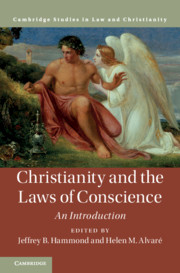Book contents
- Christianity and the Laws of Conscience
- Law and Christianity
- Christianity and the Laws of Conscience
- Copyright page
- Dedication
- Contents
- Contributors
- Acknowledgments
- Introduction
- Part I Themes in Understandings of Conscience in Christianity
- 1 Conscience in the New Testament
- 2 Conscience and Natural Law in Scripture
- 3 Conscience in Early Christian Thought
- 4 Sensus Fidei, the Magisterium, and the Formation of Conscience
- Part II Conscience According to Major Figures and Traditions
- Part III Applied Topics in Law and Conscience
- Index
- References
1 - Conscience in the New Testament
from Part I - Themes in Understandings of Conscience in Christianity
Published online by Cambridge University Press: 12 June 2021
- Christianity and the Laws of Conscience
- Law and Christianity
- Christianity and the Laws of Conscience
- Copyright page
- Dedication
- Contents
- Contributors
- Acknowledgments
- Introduction
- Part I Themes in Understandings of Conscience in Christianity
- 1 Conscience in the New Testament
- 2 Conscience and Natural Law in Scripture
- 3 Conscience in Early Christian Thought
- 4 Sensus Fidei, the Magisterium, and the Formation of Conscience
- Part II Conscience According to Major Figures and Traditions
- Part III Applied Topics in Law and Conscience
- Index
- References
Summary
Wendell Willis excavates from within the New Testament the meanings of what is termed “conscience” in the English language today. Upon surveying all the books of the NT, Willis concludes that suneidesis (the word most-often translated in the NT as conscience) does not have a fixed meaning for NT writers. Willis’s key contribution is to cleave the reader’s understanding of suneidesis into two main categories, while also identifying additional shades of meaning across NT texts. For example, in the Pauline corpus, especially in 1 and 2 Corinthians, suneidesis seems most often to refer to a person’s self-knowledge or internal understandings about himself and his past actions. Here, suneidesis should be understood as “consciousness” rather than “conscience”. In this sense, suneidesis in Corinthians is fundamentally retrospective in nature, while in Romans, suneidesis is more often a guide for the believers’ future moral choices. Other usages of suneidesis in the NT are a variation on the theme first established by Paul: consciousness of past actions or an inner model for one’s future actions.
- Type
- Chapter
- Information
- Christianity and the Laws of ConscienceAn Introduction, pp. 23 - 38Publisher: Cambridge University PressPrint publication year: 2021

